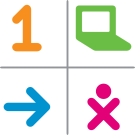Teacher-less education in an African village
 Employees at One Laptop Per Child conducted an unusual experiment . They chose two remote villages in Ethiopia, whose population was completely illiterate. There were about twenty primary school children in each village. None of them had ever been to school or seen books or a computer.
Employees at One Laptop Per Child conducted an unusual experiment . They chose two remote villages in Ethiopia, whose population was completely illiterate. There were about twenty primary school children in each village. None of them had ever been to school or seen books or a computer. OLPC employees simply brought in boxes of Android tablets on which a set of educational applications were preinstalled, and a solar charging station, which several adult villagers taught to use. There were no instructions in the boxes - anyway, no one could read them. Once a week, an employee came to the village and changed a memory card, on which a detailed history of using the tablet was recorded.
Four minutes after the children were left alone with the new toy, one of them was able to turn on the tablet. After five days, each child on average used 47 applications. Two weeks later, the children sang songs in unison to memorize the alphabet. Five months later, they made their first “hack”: the ability to change settings was initially blocked on the tablets, in addition, the camera was turned off by mistake. Children were able to bypass a simple lock, turn on the camera and customize the desktop to their liking.
For several months, they not only did not lose interest in the tablet, but even tried to write words on their own in a graphical editor. It is not yet clear whether children will be able to learn to read and write fully without the help of adults. According to the head of OLPC, Nicholas Negroponte, to find out, you need another one and a half to two years.
In the world, about one hundred million children are unable to go to school. To train a sufficient number of qualified teachers and build thousands of schools is an incredibly difficult task that is unlikely to be solved in the coming years. OLPC believes that it is easier and more effective to give children the opportunity to learn on their own.
 This approach is called " minimally invasive education."". The first experiment of this kind was conducted by a professor at Newcastle University Sugata Mitra in 1999 in India. An experiment called" A hole in the wall "was that in one of the slums of New Delhi, a computer connected to the Internet was walled into the wall. Children without without any help from adults, they learned to use it, mastered search engines and e-mail, the basics of the English language, and their grades in the school improved markedly. Since then, India, Cambodia and some African countries have already established several lko hundreds of public computers.
This approach is called " minimally invasive education."". The first experiment of this kind was conducted by a professor at Newcastle University Sugata Mitra in 1999 in India. An experiment called" A hole in the wall "was that in one of the slums of New Delhi, a computer connected to the Internet was walled into the wall. Children without without any help from adults, they learned to use it, mastered search engines and e-mail, the basics of the English language, and their grades in the school improved markedly. Since then, India, Cambodia and some African countries have already established several lko hundreds of public computers.